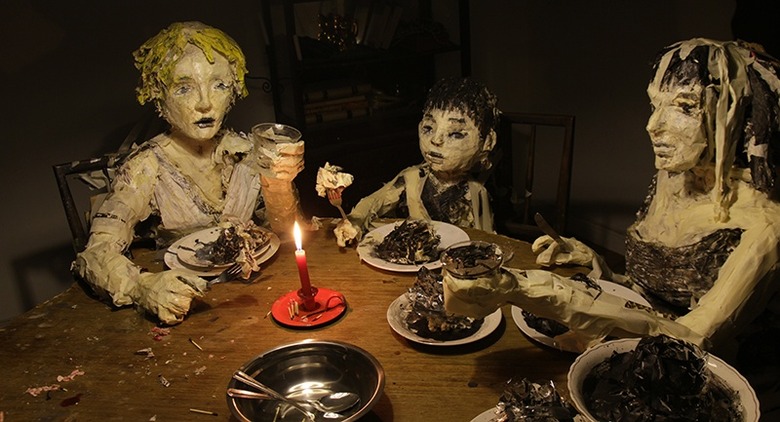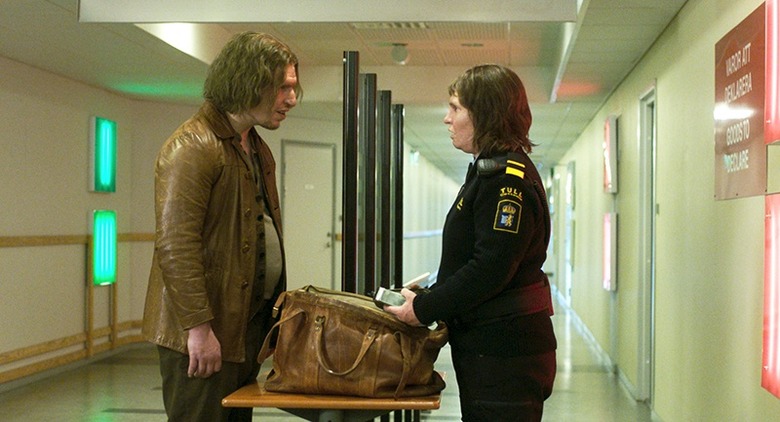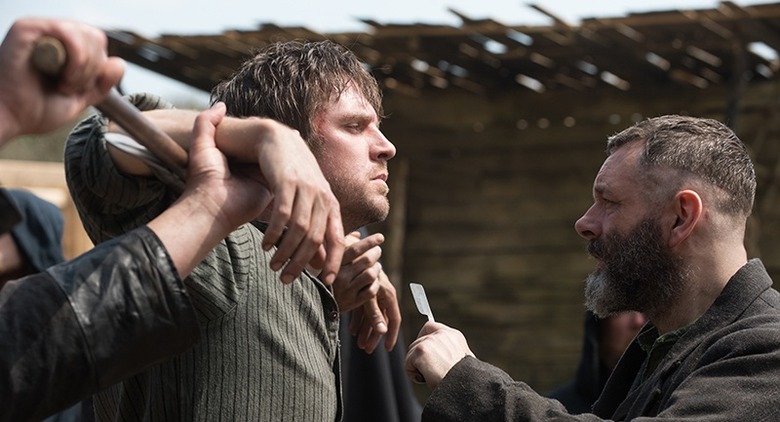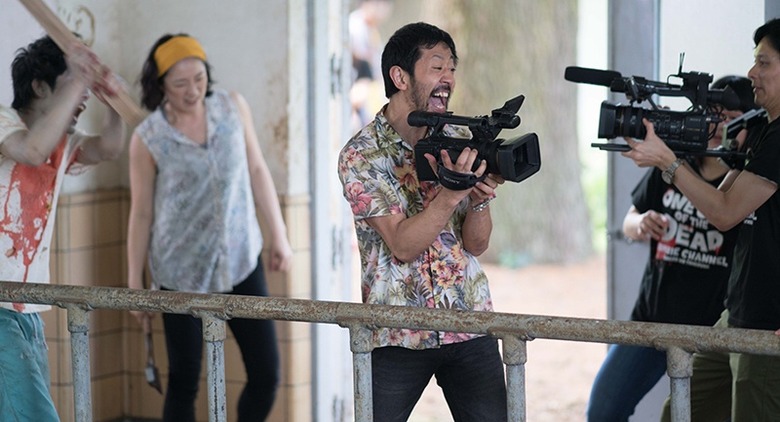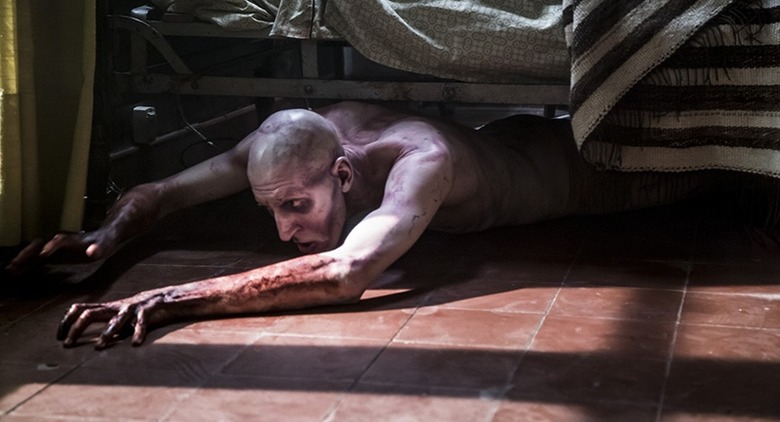Fantastic Fest Day 2: 'Border' Is A Beautifully Executed Bad Idea, 'Apostle' Delivers Vicious Thrills, And 'One Cut Of The Dead' Is The Best Zombie Comedy In Years
(Welcome to The Fantastic Fest Diaries, where we will be chronicling every single movie we see at the United States' largest genre film festival.)
Welcome to Fantastic Fest, day two. In this diary entry: a deranged stop-motion allegory, an unpredictable thriller from the writer of Let the Right One In, a new horror movie from The Raid director Gareth Evans, quite possibly the best comedy of 2018, and a horror movie with an auspicious title.
The Wolf House is a Stop-Motion Nightmare With Big Ideas
It feels impossible to openly recommend The Wolf House, but it's also a movie that I would never discourage anyone from seeing. Directors Joaquín Cociña and Cristóbal León have made something unique and singular, a movie that feels like a sinister artifact rather than a modern piece of entertainment. It is challenging, slow-moving and difficult. It is also unlike anything I have ever seen or will ever see again.
How do you explain this film in a bite-sized sentence? You cannot. The prologue sets the stage: Once upon a time, there existed in Chile a German commune, whose citizens lived in isolation from the rest of the nation. To explain their personal ethos, their way of life, they made a movie called The Wolf House, a stop-motion fable about what happened when a young girl living among them disobeyed their rules and was punished with 100 days and nights of isolation in the woods. Now, we're watching a "restored" version of this lost movie.
Of course, none of that is real, but the mere suggestion that we're watching a niche piece of history rather than a modern art project lends to the film's sinister undertones. There are no actual characters in The Wolf House and no real narrative. This is 73 minutes of Cociña and León guiding us through a bad dream, where scratchy 2D animation and homemade stop-motion mingle in constantly shifting, one-shot world. Environments evolve and decay before our eyes, character designs shift and mutate as necessary. There's a tactile nature to the film – you feel like you can touch everything on the screen and the results are haunting and grotesque.
Eventually, the truth about The Wolf House begins to emerge. The film never holds your hand and never feels the need to fill in the gaps about the intentions of its fictional makers, but anyone with a passing knowledge of 20th century world history will figure it out. And it's chilling. But for all of its visual marvels, for all of its (for lack of a more eloquent term) fucked-up revelations, The Wolf House is a chore. However, it being a chore is part of the grand design. You're not supposed to have fun. You're supposed to let this movie happen to you. If you're willing to endure it, there's something powerful here.
Border is a Terrible Idea Executed With Grace and Beauty
I'll be quite frank: if you had told me what Border was actually about, where director Ali Abbasi's new film goes during its slow-moving but entrancing 108-minute running time, I would have actively avoided it. On paper, it's a premise that makes my eyes roll into the back of my head with such force that my brain rattles. In execution, it's the best film of its kind since Pan's Labyrinth or Let the Right One In, a genre-redefining drama that straddles fantasy and reality in ways both beautiful and chilling.
So I'm going to dance around the details here and encourage you to do the same (even the Fantastic Fest programming team deliberately left any hard plot details out of the official synopsis). Just trust me when I say that this film pays off its early mysteries with a grace that shook me, moved me, and left me spellbound.
Eva Melander stars as Tina, a border agent with a sixth sense for detecting smugglers. One day, a man comes through her station and she knows something about him is different, something wrong, but she can't place it. The ensuing mystery changes her world forever.
And really, that's all you should know. But know that Melander's performance is tender and brave, and she's asked to sell concepts that have no right to work in an capacity. Yet they do work, because she finds humanity in the unnatural. Buried under piles of latex (Tina has a chromosome that has left her with an unnatural physical appearance), Melander is joyful and heartbreaking, warm and chilling – it's a performance that deserves a long, deep examination and appreciation. But once again, we have to dance around why.
Let the Right One In is the obvious comparison here because Border is based on a story by John Ajvide Lindqvist, who wrote the source novel for that instant classic (he is also one of the screenwriters here). Like how that film redefined what a vampire story can be and injected tenderness into a legend defined by its unnatural horrors, Abbasi frames the fantastical in a matter-of-face manner that only exemplifies its power and mystery. The result is sometimes unsettling, frequently romantic, and often strangely erotic, as Border challenges us to redefine what makes something sexy and asks us to view attraction through the eyes of those completely different than us. I'll say this much: Border features an all-timer of a sex scene that will leave heads spinning and mouths agape.Border is something special. And it pains me that I can't talk about why. But you'll thank me when you get the chance to see it.
Apostle is a Gnarly, Twisted (and Too-Damn-Long) Descent Into Horror
Gareth Evans is one of the most exciting filmmakers on the planet and Apostle does little to temper that statement. The director of The Raid and The Raid 2 makes movies that can only be made by him, visceral experiences that pummel audiences and characters alike with a relentlessness that is exhausting and addicting. His new movie could not be more different than the Raid movies, but this slow-burning horror film is Evans through and through, the next logical step for the filmmaker and testament to his skills beyond delivering bone-breaking action. Every genre movie fan should see it.
It is also too damn long, but hey, no one's perfect.
Set in 1905, Apostle drops us into the action with a speed that is almost jarring. A young woman has been kidnapped by a pagan cult, her wealthy father is not in position to deal with the ransom demands, and her mysterious brother Thomas (Dan Stevens) is recruited to infiltrate the cult's island compound and deal with the problem. And within minutes, the story is off the races and Thomas is on the island and everything is dangerous and no one can be trusted and the story doesn't even pause to suggest there isn't something supernatural going on here.
That may be the greatest strength of Apostle: it doesn't waste your time in its opening act and lays every card on the table. Buckle up, the movie says, things are going to get nuts.
It does take a while to get there, though. Once those cards are on the table, Evans takes his time maneuvering them, building the shaky house of cards that will tumble in the final 45 minutes. At 129 minutes, one wonders if Apostle is too long and too slow for its own good in the middle stretch. One wonders if Evans shouldn't have acted as his own editor and if there's a 100-minute cut out there that's leaner, and faster, and more effective. After all, there's a difference between a deliberate pace and wheel-spinning, and Apostle sometimes feels like it doesn't earn the slow burn it desperately wants.
Still, no one directs a situation going straight to hell quite like Gareth Evans. When the slow-burn finally ignites the fuse, Apostle delivers on the visceral action, chilling imagery, and outrageous gore and violence. The back stretch of the film is wall-to-wall with nightmare fuel and blood and crazy ideas, some of which stick and some of which do not. It's the natural extension of "Safe Haven," the V/H/S 2 segment Evans co-directed. It's a spiral into madness and chaos that's as spellbinding and gruesome as anything you'll see this year.
At the center of it all is Dan Stevens, rocking the hell out of his 1905 fashions and skulking like no one's business (Apostle proves that Stevens is the best skulker in the business). A broken, spiritually wounded man with a chip on his shoulder so large that he looks ready to collapse at any moment, Stevens' Thomas is all vicious glares and acid-tongued retorts, a man with nothing to lose except the sister he loves. Stevens is arch here, but it works – Apostle is wild enough to contain a performance this big and this is an actor smart enough to know what this material demands. As he does on FX's Legion and did in the underrated thriller The Guest, Stevens radiates an unpredictable, sexy danger that makes him one of our most valuable leading men.
Has Evans made a particularly deep movie? Not at all. Discussions about Apostle will be about its atmosphere and its mood, that Dan Stevens performance and the gore, the way Evans takes the "English cult on an island" trope and twists it into a pretzel of broken bones and splattered craniums. This movie is all style, all aesthetic. But what aesthetic! No one does aesthetic like this and sometimes, that's all we need.
One Cut of the Dead Delivers One of the Greatest Comedic Payoffs...Ever?
I've never read a film festival entry quite like the Fantastic Fest blurb for Shin'ichirô Ueda's One Cut of the Dead. It actively warns attendees that the film has a rough start, that things will seem dire for a bit, and that they need to stick it out and make it to the 30 minute mark. This was reiterated when the film was introduced: a programmer admitted that he spent the first half hour thinking that there was no way they could possibly program this garbage.
Then something magical happens – One Cut of the Dead reveals its hand. 30 minutes into its 96-minute running time, Ueda pulls the rug out from under us all and reveals the magic trick he's been so delicately setting up. That agonizing first act lays the groundwork for extraordinary pay-offs, jokes and gags and punchlines that can only function because we suffered for so long early on. Not since R100 have I seen a comedy bury the lede so deep and so effectively.
One Cut of the Dead begins as a tired zombie movie. A film crew is shooting a horror film at an abandoned building, real walking corpses attack, and everyone must band together to fight them off. But that's before the film reveals its true intentions. What at first looks like schlocky, tired junk ultimately reveals itself to be a tribute to bootstrap filmmaking, an ode to art by any means necessary, and a heart-melting comedy about family. The first 30 minutes may be interminable, but the final 30 are joyous in ways that cannot be explained without spoiling the experience.
It's rare to find a comedy that demands your patience quite like this. But it's also rare to find a comedy that pulls off its one-of-a-kind humor this well. One Cut of the Dead is the funniest movie of 2018 and I can't wait for more people to see it so we can talk about why.
Terrified Does Everything It Can to Live Up to That Title
It takes a certain amount of nerve to call your horror movie Terrified, but writer/director Demián Rugna does a fine job of living up to it. Here is a movie that is less interested in telling a coherent story than it is in just simply scaring the hell out of you. And I, your resident horror-loving scaredy cat, spent entire running time digging my fingernails into my sweaty palms.
It begins with a series of incidents. A women hears voices coming from her sink. A man is haunted in his bedroom by a mysterious creature. A child's death triggers a uniquely unpleasant response. Eventually, the various parties trying to put all of this together (a blend of paranormal investigators and police officers) realize that they're not dealing with separate haunted houses – they're deal with a haunted neighborhood. Once they decide to team up and tackle everything together, things really go to hell.
If that premise sounds like an excuse to just string together a bunch of scares on a canvas open-ended enough to allow just about anything...well, you'd be right. Rugna dabbles in every familiar set-up and style you can image. On a scene-by-scene basis, Terrified is a jump scare factory, a slow descent into madness, a surreal fever dream, and an ultra-violent chiller. The concept of a haunted neighborhood is a clever one, giving him the space necessary to stage whatever scare he wants and to subject this cast of characters to whatever vicious nightmare he care to conjure. As a funhouse ride, Terrified is a spooky, bloody, effective blast.
But what if you want more? Sorry, Terrified is not here to make sense or to explain exactly why all of this is happening and how it fits together. This doesn't feel like laziness (Rugna's script pays lip service to this entire incident being something the characters cannot comprehend), but the choice to favor horror set pieces and big scares over story, character, or basic sense will annoy as many as it pleases. However, if you just want a good scare and little more, you really can't do better than this.

